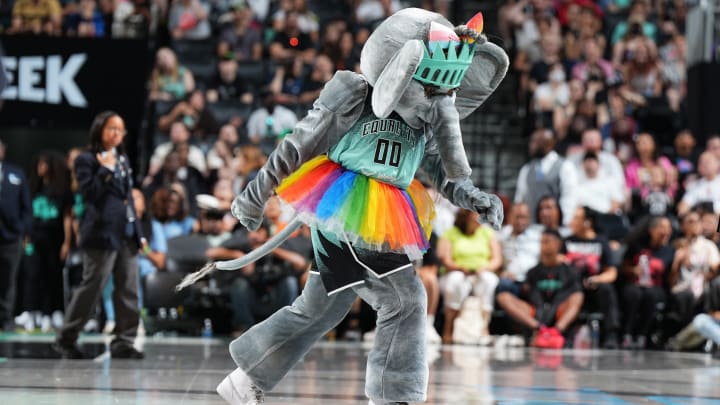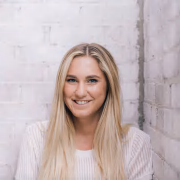WNBA’s Connection With Queer Fans Goes Deeper Than Annual Pride Games

Barclays Center was ornamented in silver Saturday afternoon, the venue shimmering for the New York Liberty’s 10th annual Pride game. The team’s beloved mascot, Ellie the Elephant, performed a special halftime set, inspired by Beyonce’s Renaissance, while tunes like “Supermodel (You Better Work)” by RuPaul and “Vogue” by Madonna bumped through the arena’s sound system. Sue Wicks, a member of the Liberty’s inaugural 1997 team and the WNBA’s first openly gay player, was on hand for the festivities, receiving a sonorous ovation from the crowd as she appeared on the jumbotron.
With Pride comes plenty of pomp and circumstance—and can sometimes feel like a rainbow-coated cursory gesture—but the WNBA’s celebration is also grounded by its fundamental queerness. The W holds a unique place in the world of sports and entertainment, as one of America’s few cultural outputs that is elementally queer and primarily women-led.
“I think this is so important. June is Pride Month, I think we celebrate it the whole of June, but it’s something that’s celebrated every single day of the week for us, in the WNBA, and all season long because we’re all about inclusion and I think that’s important and we’re leading the way on that,” said Liberty coach Sandy Brondello ahead of New York’s Pride game. “So many of our players are role models for the community, and I think that’s fantastic because we love everyone, we want everyone to come and watch us and it’s just one big family.”
Reigning MVP and Liberty star Breanna Stewart echoed Brondello’s sentiment: “For me, I am just proud that we can help people be who they want to be.”
Since the WNBA’s inception, its supporters have mirrored the league they revere, with LGBTQIA+ fans serving as standard-bearers for the sport. And in the case of New York, the Liberty’s queer fans have long shaped the culture of one of the U.S.’s most impassioned and iconic sports cities.
Not Ellie the Elephant dancing to a Renaissance mashup #wnba pic.twitter.com/1ttBJ17dhJ
— mamala harris. (@blaquecranes) June 22, 2024
Nico Schneit, a Ridgewood, Queens-based musician known as Air Waves, went to their first Liberty game 27 years ago, in the WNBA’s debut season. That period also marked an important personal development for Schneit.
“It was 1997, and that was the year I came out as gay,” recalls Schneit, adding that the two events weren’t unrelated.
Their dad, Marty Schneit, had been taking Nico to New York Knicks games since they were five, and when he heard of the WNBA starting, he asked if they’d be interested in going to a game, to which Nico responded with an apparent of course.
“They lost that game. I remember that. It was still super fun,” says Schneit, “I am really thankful for him [Marty] for taking me to that. He also took me to my first Pride parade, I think I was 13. I’ve been lucky with our relationship.” The two still share a close bond, linked by the Liberty. During New York’s playoff run last year, Nico knew they’d receive a lengthy voicemail message from their dad following each game, offering his take.
Reflecting on their introduction to the WNBA, Schneit remembers being struck by the star trio of the Liberty’s 1997 team, Teresa Weatherspoon, Rebecca Lobo and Wicks. In addition to the talent on the floor, a young Schneit, who says they knew they were gay from a very young age, could perceive that many of the fans packed inside Madison Square Garden weren’t so different from them.
“I was very repressed so it was good to see these people at the game that I could identify with,” says Schneit. “No one was out in middle school or high school.”
Nearly three decades later, and across the East River at Barclays Center (the team’s home since 2020), Liberty games are still a queer-led space. Deidree H. Golbourne, financial advisor, founder of Dei Dream Financial, film photographer and women’s sports advocate, is one of the Liberty’s most visible fans, living up to her moniker: mayor of Barclays. You can spot her courtside at Liberty home games—where she has begun bringing her clients—dancing and blowing kisses with Ellie the Elephant.
“I definitely know the importance that I bring into these spaces, but also a lot of the people of color bring into these sports spaces as well,” says Golbourne.
In many ways, Golbourne's fervent WNBA fandom felt inevitable. Growing up on Long Island, Goldbourne recalls “A lot of the older Black women that were in my community were Liberty fans. I remember seeing a lot of New York Liberty shirts …”
Golbourne's mayoral status extends beyond Barcaly’s Center too, emerging as one of the league’s most sought-after voices on X, formerly Twitter, among other social platforms. “It’s hard not to talk about women’s basketball when it very much aligns with a lot of the intersections of my daily existence,” says Golbourne. “I’m an athlete, I’m a woman, I’m queer, I’m Black.”
In Liberty games, Golbourne has found—and contributed to creating—a space she describes as necessary.“It’s beautiful, it’s inclusive, it’s needed,” she says, her voice matching the deliberateness of her words.
At her first Barclays Center game, Golbourne was featured on the Liberty’s kiss cam with her then-girlfriend, something she’d never experienced before. Now, her courtside neighbors ask about her current partner, Fran, when she’s not at games, and the venue’s staff look out for the couple. “I feel like I am partnered like other people, and that’s how spaces should feel for those that are queer, especially those who are queer, Black and masculine presenting,” says Golbourne.
She admires many Liberty players past and present, calling out Betnijah Laney-Hamilton, as well as trailblazers Weatherspoon, Kym Hampton and Crystal Robinson. But Golbourne feels a unique kinship with former MVP Jonquel Jones.
“The player on the team that probably represents me the most is JJ. Not only because JJ has locks … but JJ is engaged, she’s West Indian. And very much looks like me.”
Upon hearing Golbourne's remarks, Jones grinned, offering up her own experience of coming into the WNBA.
“It makes me feel good that I can represent that and when people see me that people feel they can see themselves,” says Jones. “And our Pride game is a big thing for people to be able to come out and be themselves and you know my journey has been kind of similar to that in terms of coming into the league and seeing people that are really living their truth and that have allowed me to kind of live my truth and be comfortable with just coming out and being myself.”
Certainly, Pride is an important recognition of the culture surrounding the WNBA, but it’s not just in June, and it’s not just at Barclays, that Liberty supporters have created such spaces. Tucked in the back of an unassuming bar on Houston Street on Manhattan’s Lower East Side, a group of Liberty fans huddled around high-top tables, positioned in front of a line of TVs. Athena Keke’s, a queer bar for women’s sports, was holding a viewing party for the Liberty-Chicago Sky game. Founders Claudia Capriles and Alexandra Murray have been holding such events at various bars around the city until they find a permanent brick-and-mortar. Seasoned in the hospitality industry, the duo’s interest in the WNBA deepened in 2020, when the WNBA’s social activism around racial injustice made headlines.
“I think it’s surprising that we all have this story of wanting to find places to watch these games and constantly coming up short. And I think specifically with queer fandom, there aren’t that many queer bars … and there seems to be more popping up, but that’s a shortage in both areas. There's no women’s sports bar and there are few queer bars. It’s this surprising gap for New York to have,” says Murray.
The queer bars that do exist have begun holding Liberty viewings more frequently, too. A small group of loyalists gather at Ginger’s in Brooklyn’s Park Slope for games, while The Bush holds watch parties in Bushwick, Brooklyn. Queer nightlife has long been the lifeblood of New York, and while it may not be a club open until the wee hours of the morning, Liberty viewings hold their own cultural capital.
With the WNBA’s rise in popularity, the league’s existing fandom and culture have also been thrust into the spotlight. Whether explicitly acknowledged when the league made Pride an official initiative 10 years ago, or not, LGBTQIA+ fans have made the W what it is since its inception. And in a market like New York (a city that sustains interests niche and broad), the shorthand, etiquette and traditions curated by the queer Liberty fans have left a fingerprint on Barclays, and the city too.
In June, and during the Pride game, the players and fans enjoyed a formal—and sparkling—celebration of the expansive house they’ve built for so many to enjoy.
